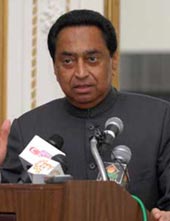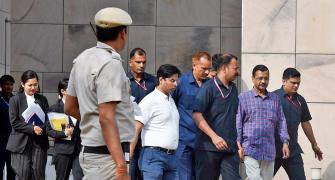Excerpted from a speech delivered by Minister for Road Transport and Highways Kamal Nath at the India Canada Chamber of Commerce in Toronto on March 22.
 I travel all over the world and I am told India doesn't do much in the financial sector: 'India should reform. India should have the best practices in the financial sector'.
I travel all over the world and I am told India doesn't do much in the financial sector: 'India should reform. India should have the best practices in the financial sector'.
In New York, many people used to suggest, 'India should have good financial regulations.' I was not sure whether I should respond. I would tell them, 'You are looking at best practices in the financial institutions in India.'
Those financial icons that used to preach to us are no longer there, or are getting money from the government. In India, banks are giving money to the government and, in these other countries, governments are giving money to the banks.
We see India continuing on its growth trajectory and transforming itself within the confines of democracy. India is in the neighbourhood of Pakistan, Bangladesh, Nepal, Sri Lanka, but moves on with its vibrant democracy. It is the largest democracy.
Of course, we have challenges of sustaining and managing growth. We talk of managing growth as it impacts all sectors, all sections of society in all parts of the country.
We are on a growth momentum. We talk of 8 per cent growth this year, 9 per cent next year and we are talking of double-digit growth in two years. In a democracy, the challenge of managing growth is enormous, as it is very important that we do it in a manner that it is all inclusive, that it is equitable.
At the heart of this lies the infrastructure and infrastructure development in all parts of the country.
We have perhaps the world's biggest infrastructure deficit. Having now privatized infrastructure in India, we are looking at the second decade of the 21st century as the decade of infrastructure. Infrastructure is now the buzzword in India.
In bridging this infrastructure deficit, we have very India-specific challenges -- from our North-east and our roads in Kashmir to the backward areas of Bihar, Uttar Pradesh and Madhya Pradesh, and supplementing our ports with industrial production that is increasing by 20 to 30 per cent. All these put further strain on infrastructure.
Also, when you talk of economic fundamentals you have to superimpose that on the economic fundamentals of India's young profile -- our median age is 25 years -- and growing disposable income in rural India.
The growing disposable income in rural India also means growing demand on the infrastructure. And on this we have embarked. By 2018, we will have 450 km of underground metro network. London has 408 km.
Whether it is in Hyderabad or Bangalore, we need road connectivity to the ports and airports. So, we have targeted 20 km of roads every day, 7,000 km a year. To be able to complete 7,000 km of road in a year, we need to have 20,000 km of work in progress. And 20,000 km of work in progress means $50 billion work in progress. It is an enormous capacity.
We need roads to connect some of the backward areas of the country, generating economic activities for the areas, which have not been touched by roads.
Roads impact agriculture, industry, trade. We are the second largest producers of fruits and vegetables in the world. Sadly, 40 per cent of it rots because of lack of infrastructure. It means so much of our economy lies outside the market economy.
To bring these into the market economy, we need rural connectivity.
When we look at the retail sector, 97 per cent of India's retail sector is unorganized, and much of that is outside the market economy. No banking system touches them.
To bring them into the mainstream, the infrastructure challenges have to be met.
I am here in Canada to meet with construction companies. We have huge building capacity. In this 7,000 km per year, 60 per cent will be on BOT (built operate transfer) basis; 25 per cent will be on deferred payment of 25 years, more or less on sovereign guarantees and 15 per cent will be on EPC (engineering-procurement-construction). That means we need investments of about $70 billion in the next three to four years, of which $40 to 45 billion will be from the private sector.
Foreign investors should understand India is now a good investment destination. Roads are a good asset. There's no risk of less traffic in India. With our framework of laws, as a country that respects intellectual property, India's credibility is of the highest order today.
The world is no longer looking at India for investment alone. India is a large investor overseas. India is a large investor in Canada. It is now a two-way street. During the last two years, India has made more investments in the United States and India is creating more jobs in that country. Our investment in the United Kingdom is larger than investment from Australia.
India is not only an exporter. We are importers as well. Our non-oil imports are growing substantially. We are a huge market for the world, huge market for Canada. That's the growing story of India. India will be one of the engines of growth of the global economy.






